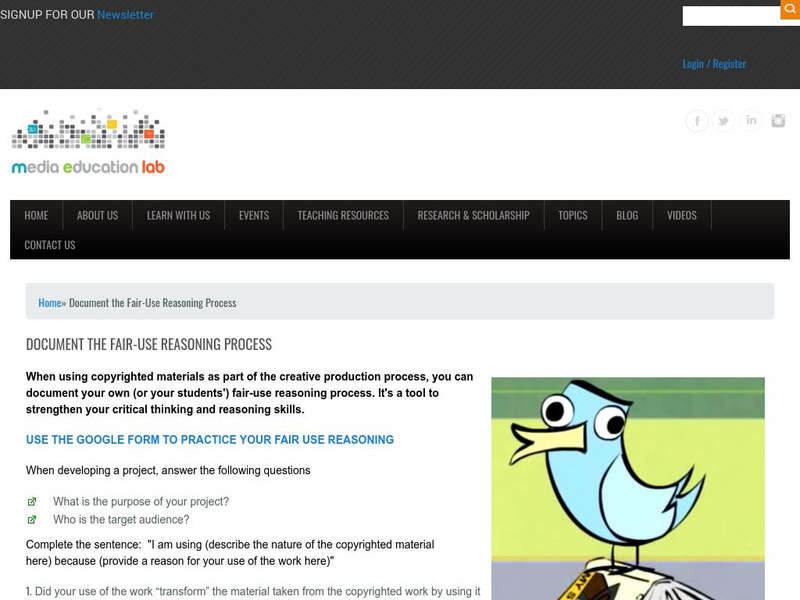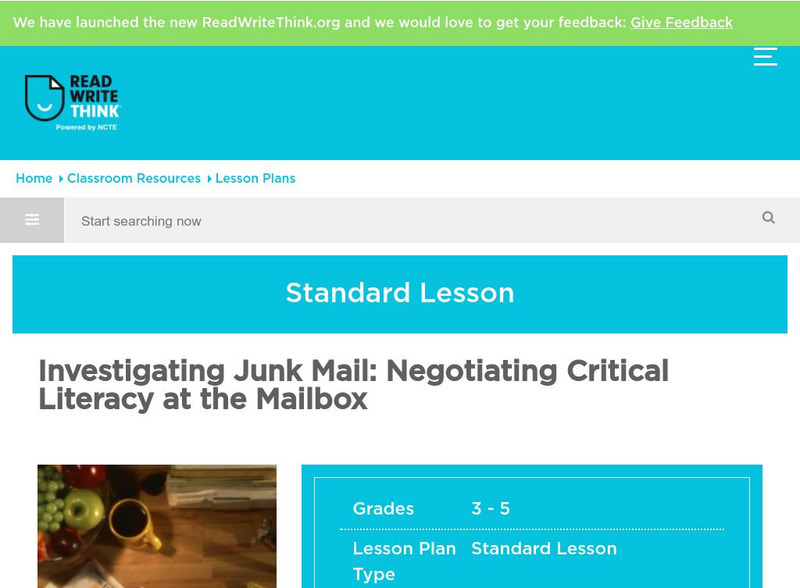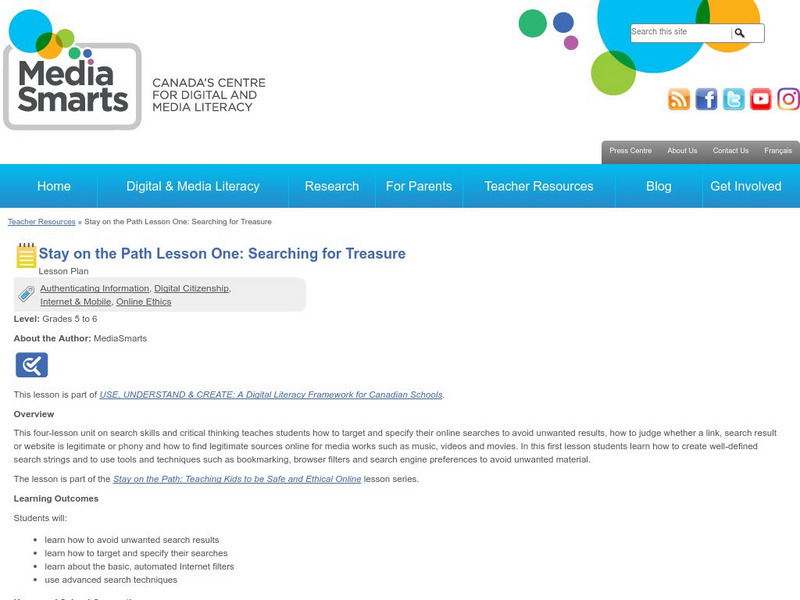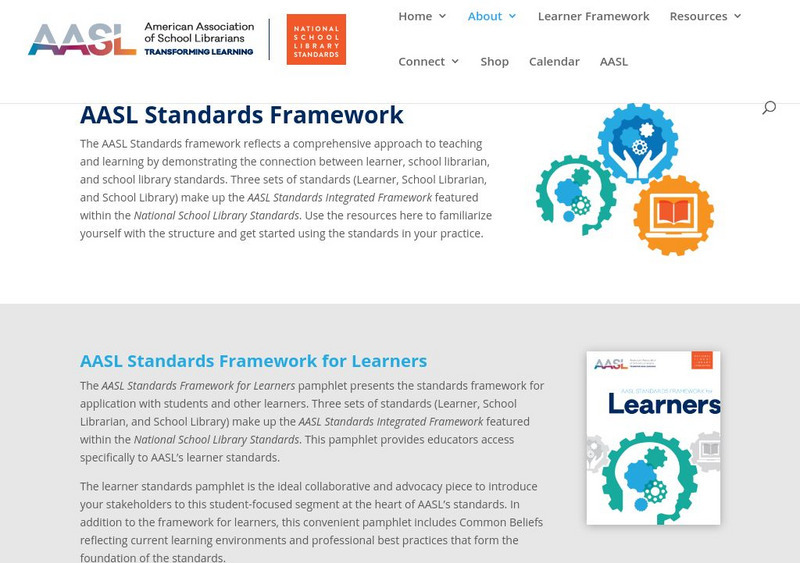Common Sense Media
Common Sense Media: Education: Lesson: Digital Trails
[Free Registration/Login Required] Does what you do online always stay online? Students learn that the information they share online leaves a digital footprint or "trail." Depending on how they manage it, this trail can be big or small,...
Other
U. Of Rhode Island: Media Education Lab: Document the Fair Use Reasoning Process
When using copyrighted materials as part of the creative production process, you can document your own (or your students') fair-use reasoning process using this Google form. It's a tool to strengthen your critical thinking and reasoning...
PBS
Pbs Learning Media: Walt Whitman: Journalist and Poet
Through an examination of primary sources and watching a short video, learners will learn about Whitman's love for and criticism of the United States.
PBS
Pbs Learning Media: Pbs Media Literacy Education Certification by Kqed
Demonstrate your expertise in teaching PreK-12 students to think critically about their roles as media consumers and creators -- or in training teachers to do so. Competency-based validation of media literacy skills for educators of all...
Common Sense Media
Common Sense Media: Education: The Reality of Digital Drama (6 8)
Students discuss their impressions of peer drama, both online and as depicted on reality TV. Students compare and contrast two videos - one featuring a candid discussion between middle school students about online drama and the other...
PBS
Pbs Learning Media: Ready to Learn Collection
Through the Ready To Learn Initiative, funded by the U.S. Department of Education, CPB and PBS are partners in developing high-quality educational media and resources to advance critical early learning skills for children ages 2-8 to...
Louisiana Department of Education
Louisiana Doe: Curriculum Hub: Ela Guidebooks: Teenage Brain: Review Claims About Social Media
Review claims made in "Teens: This Is How Social Media Affects Your Brain."
PBS
Pbs News Hour Extra: Social Media and Non Violent Protest
Lesson plan tackles the turbulent events in Egypt and other Middle East countries by asking students to examine political cartoons and understand how social and traditional media served as a tool for the nonviolent protests. February, 2011
PBS
Pbs Learning Media: Alma's Way: Think It Through
As Alma learns about families, friendships, and communities, she discovers that sometimes challenges and conflicts arise. In those moments, Alma stops and "thinks through" the situation. Then, she knows what to do! Support critical...
Associated Press
Associated Press: Facebook's Fake News Problem: What's Its Responsibility?
Is it real? Is it reliable? Can it be confirmed? Always check sources of news found through social media outlets before believing it. Facebook's Mark Zuckerberg is facing criticism for the amount of fake news posted on Facebook....
PBS
Pbs News Hour: Did Fake News Influence the Outcome of Election 2016?
Don't believe everything that is read on the Internet! So many people around the world follow the news, all news, that they find posted on social media. Some news is real, some news is fake. How much of the fake news might have...
PBS
Pbs Learning Media: Ideas in Action: Visit Other Classrooms
Teachers address the practice of visiting other classrooms to observe student argumentation and criticism in mathematics. [1:19]
PBS
Pbs Learning Media: Virtual Professional Learning Series
Our Virtual Professional Learning Series is created for teachers-by teachers-to bring together content experts and educators from all backgrounds. With an emphasis on fun, engaging, accessible, and free tools for classrooms, these...
ReadWriteThink
Read Write Think: Junk Mail: Negotiating Critical Literacy at the Mailbox
Contains plans for three lessons that teach students to examine junk mail critically. In addition to objectives and standards, this instructional plan contains links to sites used in the lessons as well as assessment and reflection...
Media Smarts
Media Smarts: Stay on the Path Lesson One: Searching for Treasure
This four-lesson unit on search skills and critical thinking teaches young scholars how to target and specify their online searches to avoid unwanted results, how to judge whether a link, search result, or website is legitimate or phony...
McREL International
Mid Continent Research for Education and Learning: Deconstructing Media Messages
This brief instructional activity focuses on the roles that many different people play in the creation of media messages and advertising.
PBS
Pbs Learning Media: Pbs News Hour Student Reporting Labs Collection
Student Reporting Labs (SRL) creates transformative educational experiences through video journalism that inspire youth to find their voice and engage with their communities. SRL lesson plans, assignment prompts and instruction tools...
Edutopia
Edutopia: Media Smarts: Students Evolve From Consumers to Critics and Creator
This article from Edutopia offers an overview of both the importance of media literacy and some innovative examples of teaching media literacy.
Other
How to Detect Media Bias & Propaganda [Pdf]
A portion of a larger book, this site is critical of journalism as it is presently practiced. This portion offers characteristics of critical news consumers.
Other
Rhetorica Network: Media / Political Bias
A detailed explanation of how bias works is offered at this site, including critical questions for detecting bias in writing.
PBS
Pbs Learning Media: Detective Elmo: The Cookie Case
Critical thinking is the spotlight here as you help Detective Elmo save Cookie Monster and crack the cookie case!
Media Smarts
Media Smarts: How to Recognize False Content Online: The New 5 Ws [Pdf]
A tip sheet to help both students and adults learn how to test online content for validity.
American Library Association
Aasl: Standards for the 21st Century Learner
This document contains the Standards for the 21st-Century Learner published by the American Library Association. The standards provide a conceptual framework and broad guidelines for describing the information-literate student. These...
NPR: National Public Radio
Npr: Fake or Real? How to Self Check the News and Get the Facts
Read a story on Facebook. Read the headline and think it's too good to be true, but it looks like it's from a news site. Experts offer tips to help sniff out fact from fake. One of today's greatest challenges in a media bombarded culture.









